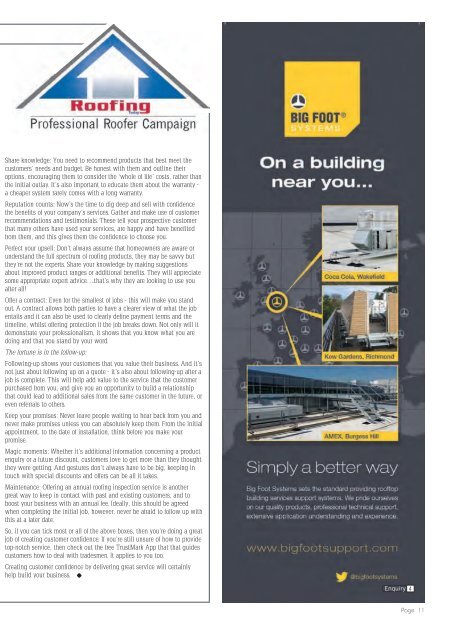Roofing
T82VZ
T82VZ
You also want an ePaper? Increase the reach of your titles
YUMPU automatically turns print PDFs into web optimized ePapers that Google loves.
Training to be a Professional Roofer<br />
Livia Williams, <strong>Roofing</strong> Industry Alliance Training Manager, assesses the skill needs of the UK<br />
roofing industry and shows how all roofing operatives can improve as Professional Roofers<br />
through training and qualifications.<br />
Over the last 12 months, UK financial reports have been delivering<br />
some encouraging statistics on the economic recovery and<br />
construction industry growth, and the roofing industry is<br />
endorsing this. We, indeed, hear that roofing contractors across<br />
the UK have got full order books for the next 12 months. While this<br />
does sounds very encouraging and demonstrates real signs of<br />
business growth, roofing contractors are also facing a massive<br />
challenge in finding ‘good roofers’ to carry out the work on site.<br />
And that leads on to a very interesting debate that the roofing<br />
industry has been having for many years. What is the roofing<br />
contractor’s definition of a ‘good roofer’ and how can we get our<br />
operatives trained to become ‘Professional Roofers’?<br />
The concept of a professional roofer will include the need to be<br />
fully qualified, fully competent, have up-to-date health & safety<br />
training and hold the minimum blue CSCS Skilled Worker Card.<br />
<strong>Roofing</strong> supervisors and managers would also need to have a<br />
Level 3 Site Supervisor qualification or Level 6 Construction Site<br />
Operations, the SSSTS or SMSTS and the Gold Supervisor CSCS<br />
Card or Black Managers CSCS Card.<br />
Generally speaking, the roofing industry’s approach to training is<br />
reactive as opposed to proactive. Much training activity is driven<br />
by the requirements of main contractors, PQQs or health & safety<br />
quality systems like CHAS and ISO. During busy times, roofing<br />
employers have been facing a big dilemma of how to get their<br />
operatives trained and CSCS carded without facing delays and<br />
penalties onsite. Unfortunately, this approach to training has had<br />
disastrous consequences for the skilled roofing labour market, and<br />
without a collective corporate responsibility of investing in and<br />
training the workforce, there will never be a solution to reducing<br />
the shortage of skilled labour in the UK roofing industry.<br />
CSCS statistics on the number of roofing operatives who hold the<br />
Blue CSCS Skilled worker card across all roofing disciplines are<br />
disappointing. The figures will become even more worrying when<br />
all the CSCS cards issued to the roofing sector under the old<br />
‘Grandfather rights’ rules can only be renewed only if you have<br />
achieved a minimum Level 2 roofing qualification. It is now time<br />
that the roofing industry acknowledges that we are operating on a<br />
knife-edge. Without taking immediate action by investing in<br />
training, developing and qualifying our roofing operatives,<br />
supervisors and managers, we will have little alternative but to<br />
continue to turn down millions of pounds worth of work,<br />
encourage a ‘mercenary’ culture amongst roofing operatives, and,<br />
ultimately, obstruct future growth for the roofing industry.<br />
Specialist roof training in the UK has been undergoing a complete<br />
restructuring due to a continuous change in qualifications and<br />
competencies and a need for a multi-skilled workforce, economic factors<br />
and product innovations coming into the market.<br />
Since January 2014, the <strong>Roofing</strong> Industry Alliance (RIA) has taken an<br />
active role to develop a National Roof Training Strategy by coordinating<br />
roof training in all UK regions and ensuring that we are all focusing on<br />
the ultimate goal – qualifying the workforce.<br />
For many years, roof training delivery was very fragmented; each region<br />
had done their ‘own thing’ without understanding what was happening<br />
in other regions. There were a lot of missed opportunities for sharing<br />
best practice and funding for running projects nationally. The lack of<br />
coordination and strategy is reflected in the levels of roof training today.<br />
Driving Force<br />
The <strong>Roofing</strong> Industry Alliance brings a new approach: indicating how<br />
specialist training should be developed and delivered intelligently and<br />
strategically through assessment and evaluation. Through its integrated<br />
t<br />
Page 12<br />
Enquiry 16


